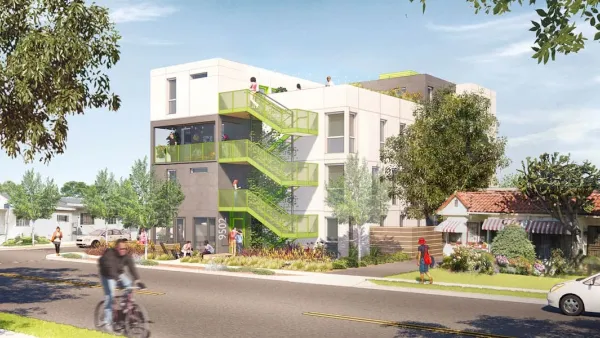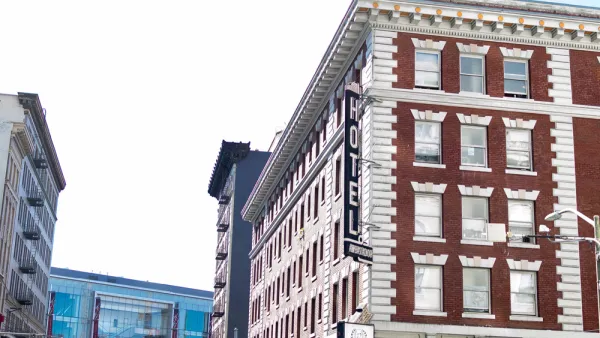Lego-type housing construction has attracted the attention of two separate developers as an efficient means to provide housing for the city's large homeless population but has met objections from labor unions and the Mayor's Office.
"For the past year, developer Patrick Kennedy, owner of Panoramic Interests, has been pitching City Hall on his plan to use metal shipping container-style boxes in quickie-construction projects that can be turned into supportive housing for the homeless — complexes that offer services for people in addition to a roof," reports Kevin Fagan for the San Francisco Chronicle.
These would not be individual homes on the ground like some modular or tiny houses. "Panoramic architectural drawings indicate an 8-story building, starting with 200 units with the potential to grow to more than three times that," stated Fagan in a phone call.
He added that the article stemmed from a June report he wrote on supportive housing as part of the "Beyond Homelessness" project undertaken by the Chronicle "with more than 70 other news organizations to focus attention on the seemingly intractable problem of homelessness in our region."
Kennedy has proposed building "above a city-owned parking lot at Highway 101 and Cesar Chavez Street, and he says he can quickly construct thousands more around the city."
- Each unit fully furnished with private bath & kitchenette
- 160 sf (8′ x 20′)
- 9 ft ceiling height
- 7 ft window height
Land and labor obstacles
- "The main construction unions that would be involved are balking at the fact that Kennedy’s metal boxes would be built in China, not by American union workers, and say they believe building-code requirements are less stringent for modular construction.
- "And Jeff Kositsky, head of San Francisco Mayor Ed Lee’s newly created Department of Homelessness and Supportive Housing, is resistant to Kennedy’s proposal to build on city-owned land, saying there are already too many demands being made on scarce public property."
Another modular proposal by "Community Housing Partnership, one of the biggest supportive-housing developers in the city," would use wooden units manufactured in Idaho, which would also be cheaper and quicker than conventional construction. "But one disadvantage of wooden units is that they are more costly and time-consuming to put together than the metal project Kennedy has in mind," adds Fagan.
Cheaper, faster to build than conventional housing
Conventional affordable housing costs about $400,000 per apartment to build. Kennedy says his Lego units would cost about $200,000 each, and that he would absorb the up-front expense.
Kennedy says he could complete construction in nine months, compared with as long as five years for more conventional buildings.
"Modular construction saves time and money — at least 20 percent in construction costs and 40 percent in time — that’s been proven," agreed Carol Galante, a University of California, Berkeley professor who specializes in affordable housing and urban policy.
Other modular housing for homeless
The "Lego Building" in the Bronx is one such example. A seven-story structure building with 63 affordable units at the site of a former used-car lot completed in the summer of 2015, housing 38 previously homeless tenants.
"American Family Housing, a nonprofit that builds housing and provides services for the homeless, is creating California’s first shipping-container apartment building," reports Doug Smith for the Los Angeles Times. Unlike most other modular construction, these were actual shipping containers.
They will be joined three to a unit and stacked to form a two-story, 16-unit apartment building for homeless veterans.
The homes are being assembled in a vacant lot next to American Family Housing’s Midway City headquarters in Orange County.
The fact that these were actual shipping containers may mean little to a formerly homeless person. As Marc Trotz, director of Housing for Health in Los Angeles County, told Fagan:
“There has to be something between a cardboard box on the street and a $400,000 unit that we can do. We have to start innovating, and modular housing is very exciting.”
FULL STORY: Tiny apartments for homeless hit snags over labor, land

Analysis: Cybertruck Fatality Rate Far Exceeds That of Ford Pinto
The Tesla Cybertruck was recalled seven times last year.

National Parks Layoffs Will Cause Communities to Lose Billions
Thousands of essential park workers were laid off this week, just before the busy spring break season.

Retro-silient?: America’s First “Eco-burb,” The Woodlands Turns 50
A master-planned community north of Houston offers lessons on green infrastructure and resilient design, but falls short of its founder’s lofty affordability and walkability goals.

Test News Post 1
This is a summary

Analysis: Cybertruck Fatality Rate Far Exceeds That of Ford Pinto
The Tesla Cybertruck was recalled seven times last year.

Test News Headline 46
Test for the image on the front page.
Urban Design for Planners 1: Software Tools
This six-course series explores essential urban design concepts using open source software and equips planners with the tools they need to participate fully in the urban design process.
Planning for Universal Design
Learn the tools for implementing Universal Design in planning regulations.
EMC Planning Group, Inc.
Planetizen
Planetizen
Mpact (formerly Rail~Volution)
Great Falls Development Authority, Inc.
HUDs Office of Policy Development and Research
NYU Wagner Graduate School of Public Service




























